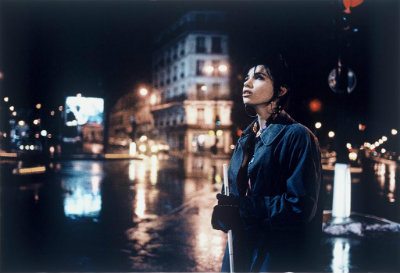Last Night I Watched: Night On Earth (1991)
Night on Earth is the end of what I would classify Jim Jarmusch’s first period of filmmaking from 1980-1991, concerning realist stories with meandering plot and a focus on characterization and situation comedy.
Whilst a strong and entertaining film with some note-worthy performances, it unfortunately falls slightly behind the rest of his filmography due to the most contentious of problems of anthology films – a lack of overarching narrative thrust. Lack of narrative thrust has never really been a problem in Jarmusch’s world; here it shows slightly due to the style and content of the film. Night on Earth is ultimately a minor work of Jarmusch’s, but still an entertaining and thought provoking independent film.
Really, at its heart, the film is a love-letter to the cities of the world. Taking place in five different cities across the world and during the same night, each of the five stories included in the film focus on the relationship between a taxi driver and his or her passenger. It’s an international extravaganza, with locale including in this order Los Angeles, New York, Paris, Rome, and Helsinki. It’s the one film in Jarmusch’s filmography that isn’t too concerned with American themes, and for that reason it’s probably one of his most interesting if flawed films.
You’ll never look at a pumpkin or a sheep the same way again.
The film starts off slowly with a not too-interesting first segment in Los Angeles with a up-and-comer Winona Ryder, who does her best with the least interesting screenplay of the film, but kicks into gear with the most pleasant of the segments set in New York, in which a black bystander who can’t get a lift from any taxi is picked up by a taxi driver who happens to be a German immigrant who cannot speak English, doesn’t know his way around New York, and is having trouble with the automatic transmission. Their quick and developing friendship is heart-warming to behold and funny in equal measure, as both characters find the solace they were looking for.
The Paris segment is interesting but, like the Los Angeles segment, lacks the umph of the New York segment, although it offers some interesting commentary on foreigners working in a new city, featuring a really interesting conversation between a blind woman and a taxi driver from the Ivory Coast. Next we have the funniest segment of the film, set in Rome, and also arguably the funniest moment in any Jarmusch film, as the manic and sexually frustrated taxi driver (played by Roberto Benigni, star of his earlier masterpiece Down by Law and an international superstar in his own right) starts confessing to a Catholic priest in his car. You’ll never look at a pumpkin or a sheep the same way again.
Jarmusch saves his most emotionally sobering and meaningful transaction for his last segment, in Helsinki. I won’t spoil the brilliant writing or heart-breaking acting on offer – but be prepared for a thoughtful and introspective ending, as the sun rises. I think Jarmusch, in this film, is trying to show that all of humanity, across the world, with all of its different cultures and languages, ultimately arrives at the same place. Whether it be comedy or tragedy, action or boredom, change or inertia, all of these stories address the human spirit in its most simple form. It connects all of these characters wonderfully. Whilst some of the segments may be lacklustre, the others more than make up for it. Certainly not his best film (Jarmusch’s filmography is overflowing with small indie masterpieces) but one of his most interesting and sobering.
If you’d like to watch this, or any film from Curzon Home Cinema‘s Mavericks and Vanguards collection, we’ve partnered with them to give you 25% off film rentals for that collection until 22nd May. Use CRZWAR25 at the payment option page.
Images and trailer provided by Curzon


Comments